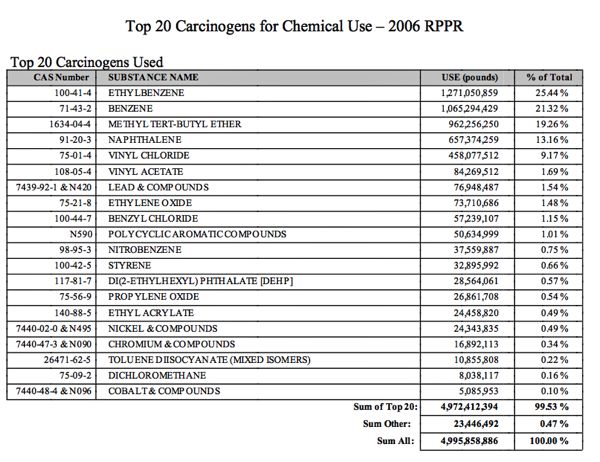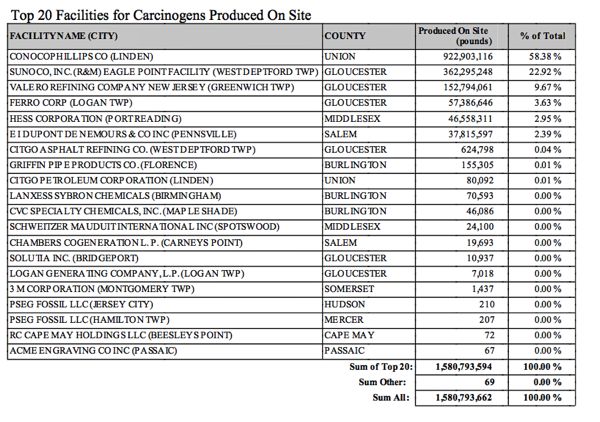NJ’s Once Progressive Toxic Use Reduction Policy Is Gone in Age of Christie
[Update: 12/2/12 – News update:
- This Courier-Post story gets the science and focus right: Expert: ‘This is really bad stuff’ – Toxicologists say vinyl chloride a carcinogen
- This Wall Street Journal article correctly notes the success of OSHA regulation to reduce (but not eliminate) occupational exposures, but overstates the “vanishingly low” long run cancer risks, which are scientifically unknown as a result of no threshold to carcinogens: Isolated Exposure to Vinyl Chloride Gas Unlikely to Have Long-Term Impact
- This Philly Inquirer story focuses on the cleanup, but muddies the science with an assertion about levels meeting “acceptable limits for prolonged exposure to the chemical”. Whose levels? What health endpoints were the basis of these levels?
- The story out of Philly should be “How We Dodged a Bullet – Thousands would have died if this were a chlorine tanker rupture” –
- It seems that, aside from the press office, that DEP is playing a small role. My sense is that DEP is staying under the radar due to Martin “hands off” policy of delegating to county and local government, lack of resources, and intentional effort to do absolutely nothing on toxic chemicals on the scientific or regulatory front. That’s a real shame, because in the 1970’s and 80’s, DEP made its reputation as an organization and held a national leadership posture in emergency response, toxicology, and regulation of chemicals. – end update
I want to make a few points in a quick followup on yesterday morning’s Toxic Train Wreck in Paulsboro, NJ. (note that I quickly corrected that initial post because I was working off the first press report only, and I mis-stated the seriousness and severity of the problem. I don’t want to be accused of downplaying the problem, that’s DEP’s MO!).
I fear the context and the implications are being lost in the flurry of reactive news coverage.
First of all, the story is being reported almost exclusively as a train wreck due to a bridge collapse – these are real issues, but the larger problem is not railroad safety or bridge maintenance. Second, the scope of the responses to the problem is similarly limited to federal rail safety.
Industrial activities require a complex and dangerous infrastructure of extraction, transportation, manufacture, distribution, use, and disposal. Any activity should be looked at in terms of its full lifecycle.
For example, if a train (or truck) loaded with fracking wastewater derailed or crashed in Pennsylvania, would environmentalists and the media be talking about rail and truck safety?
Of course not – it would be a story about the larger context: the dangers of fracking and the need to ban and more strictly regulate it.
Environmentalists correctly argue that fracking imposes inherent risks, including things like truck and rail accidents that are statistically certain to happen.
In response to such a similar accident, if a Pennsylvania Senator issued a press release that focused on rail safety as priority one, environmentalists would correctly blast him for covering up for the State’s home fracking industry.
So, the media, environmentalists, and Senator Lautenberg all are missing the story – the real story are the huge risks of chemical manufacturing, increasingly lax oversight, and increasingly severe adverse public health, environmental, worker, and safety risks.
So let me repeat: As I wrote:
NJ industries use over 15 BILLION pounds of hazardous chemicals per year. That number has grown slightly from 1990 – 1998 (most recent data reported by DEP Pollution Prevention – see Figure 4). That’s almost 2,000 pounds for each resident.
Hundreds of NJ Communities are threatened by scores of dangerous chemical facilities, where an accident or terror attack could kill more than 100,000 residents.
In comparison, press reports indicate that the railcars involved in the crash released approximately 120,000 pounds of the highly toxic and carcinogenic gas, vinyl chloride (VC).
Those train cars are not just wandering around and the risks from the cargo they carry is not just related to transportation.
Those trains go to chemical plants, where workers, communities, and the environment are exposed to and impacted by DEP permitted and unregulated fugitive emissions – as well as put at immediate risk of catastrophic accident – on a daily basis. I’m sure this is one reason why NJ has some of the highest cancer rates in the country.

NJ rates higher than US - black significantly higher than whites, show disproprotionate impact, environmental injustice
To give you some idea of the magnitude of these risks, the most recent published DEP Right to Know annual data (2006) show that 79 NJ chemical plants across densely populated areas of the State used more than 458 MILLION pounds of vinyl chloride – 3,816 times more than that rail car carried.
VC is regulated by NJDEP in NJ under the “Toxic Catastrophe Prevention Act” (TCPA) as a “extradordinarily hazardous substance” (EHS) These are substances that can kill you – immediately – as in death. The NJ TCPA program was created in response to the chemical accident in Bhopal India, that killed thousands of people.
The threshold for regulation of VC is storage of at least 10,000 pounds – so, if that railcar were an industrial facility, it would be regulated by the DEP and required to do an “off site consequence analysis” of a “worst case scenario” catastrophic accident, submit a risk management plan, and implement measures to reduce risks.
Vinyl chloride also is a known human carcinogen (NJ RTK link, for some reason ATSDR not functioning) – one of the few chemicals that are absolutely proven to cause cancer.
Under the groundbreaking 1990 Pollution Prevention Act, it used to be the policy of the State of NJ and the DEP to promote and regulate facilities to achieve “toxic use reduction” – actually reduce the production and use of the toxic chemicals.
Unfortunately, the chemical industry viewed the Act as an existential threat to their ability to keep on manufacturing unlimited amounts of deadly poisons.
So, that policy is no more, especially in the age of “job killing red tape” Gov. Christie, where DEP Commissioner Martin says DEP’s job is to “promote economic development” and treat the chemical industry as a “customer”.
But the fact remains: the product is the problem.
(and here are the industries and locations that are poisoning you with carcinogens)



Pingback: WolfeNotes.com » Air Monitoring Data Shows Toxic Train Wreck Vinyl Chloride Levels Were 10 – 20 Times Higher Than Federal Safety Levels
HazMat Experts and Firefighters petition Dow Chemical and Union Pacific for safe rail tank cars transporting gas chlorine. Secondary containment is a necessary improvement that must be implemented. See–PETITION C KIT for First Responders Comments.
Pingback: WolfeNotes.com » National Safety Board Report on Paulsboro Toxic Train Derailment Provides Devastating Criticism Of NJ’s Oversight of Chemical Safety
Pingback: fitflop online
Pingback: WolfeNotes.com » A Shameful Toxic Legacy: From Lodi And Paulsboro, NJ To Palestine, Ohio